By Marvlin Anthony
Transnational crime continues to affect countries across the region. But whilst it has long been an issue, Executive Director of the Regional Security System (RSS) Errington Shurland recently stated that it cannot persist without corruption.
Shurland (at the Opening Ceremony of RSS’ Council of Ministers Meeting) said that over the past year, the RSS has engaged with a number of partners to tackle the issue.
As noted on asisonline.org, transnational crime poses a significant and growing threat to national and international security, with dire implications for public safety, public health, democratic institutions, and economic stability across the globe.
In his speech on Friday, Shurland said that “weak institutions create an environment for corruption to flourish leading to poor enforcement, lack of transparency and accountability, and compromised adherence to the rule of law thus reducing organized crime groups risks and increasing their profits.”
According to him, “corruption refers to dishonest behaviour by those in positions of authority. It includes the giving or accepting of bribes or inappropriate gifts, double dealing, under the table transactions, manipulating elections, diverting funds, laundering money and defrauding investors.”

To get a grip on the situation, Shurland suggested “efficiency in public sector management, accountability, access to information and transparency,” all of which “are essential to good governance and help to control corruption.”
Moreover, he said, the RSS understands the importance of having a robust system and with this in mind, “we at RSS continue to coordinate activities that advance our member states capacity to protect the shared maritime space, a tradition that we are proud to claim for more than 40 years.”
The Regional Security System was created out of a need for a collective response to security threats which were impacting the stability of the region in the early 1970’s and 1980’s, according to a post on the RSS’ website.
In October 1982, four members of the Organisation of the Eastern Caribbean States, namely, Antigua & Barbuda, Dominica, St. Lucia and St. Vincent and the Grenadines, signed a Memorandum of Understanding (MOU) with Barbados to provide for “mutual assistance on request”. St. Kitts and Nevis joined after gaining independence in September 1983 and Grenada in January 1985. The MOU was updated in 1992 and the RSS acquired juridical status in March 1996 by way of the Treaty which was signed in St. Georges, Grenada.
“As we continue our quest for sustained stable and peaceful societies in our small and low-lying developing states, we continue our thrust to reduce the impact of transnational organized crime to a manageable public safety concern,” Shurland stated.
Additionally, he said, “as transnational organized crime networks operate across national borders, understanding of the broader impact of international networks that support these crimes is needed. Organized crime groups make use of legitimate structures and financial institutions to wash the proceeds of their crimes. In developing states these crimes and corruption are codependent thereby contaminating the entire economy.
We at RSS understand the strategic importance of robust counter transnational organized crime responses and the protection of the maritime and cyberspaces of our member states as these three pillars strengthen our member states ability to advance the blue, green and traditional economic development for the betterment of their citizens.”





![Attendees at the UHC logo and website launch [Photo credit: GOSL]](https://thevoiceslu.com/wp-content/uploads/2026/02/Attendees-at-the-UHC-logo-and-website-launch-380x250.jpg)






![Remnants of an alleged drug boat blown up in a lethal strike by the U.S. military last week surfaced off Canouan on Saturday [Photo credit : St Vincent Times]](https://thevoiceslu.com/wp-content/uploads/2026/02/Remnants-of-an-alleged-drug-boat-blown-up-380x250.jpg)
